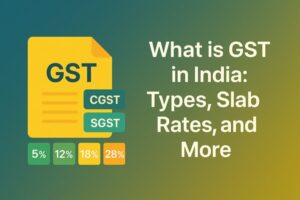GST on Car
- 2 Sep 24
- 8 mins
GST on Car
Key Takeaways
- GST on cars in India ranges between 5% and 28%, with additional cess that can drive the total tax rate up to 50% based on vehicle category and engine capacity.
- The introduction of GST simplified the tax structure and reduced the overall tax burden for car buyers compared to the pre-GST era.
- Car manufacturers benefit from GST due to the elimination of multiple indirect taxes, reducing operational costs and potentially increasing profits.
- Dealers and importers can now claim Input Tax Credit under GST, which was not possible with earlier tax regimes like VAT and excise duty.
- Despite the streamlined tax structure under GST, external factors such as inflation and economic downturns have led to a decline in vehicle sales in recent years.
Just like most other taxable products and services sold in India, Goods and Services Tax (GST) applies to motor vehicles too. The GST on different types of vehicles is divided into several slab rates like 5%, 12%, 18% and 28%. As we examine the prices of cars that are intended to be used for personal or commercial use, the most relevant rate comes out as 28%.
On the other hand, the lowest GST rate i.e., 5% is levied on the sale of carriages that are built for the daily commute of disabled people.
Additionally, compensation cess rates of up to 22% can be charged by the prospective car owner aside from the GST. It results in a cumulative tax rate that can go as high as 50% for each motor vehicle owner.
What Is the GST Rate for Cars?

The rate of GST to be applied to a car depends on multiple key factors. Among them, some prominent elements include:
- Classification of the vehicle
- Fuel type
- Usage purpose
Based on the parameters mentioned above, the final GST rate varies between 5% and 28%.
GST Rates on Cars in India
In this section, you can refer to the varying car GST rates imposed due to numerous factors.
- GST on Car Based on Category
The following table provides a brief idea about GST on motor cars as per their build category:
| Categories of Cars | Popular Car Models | Pre-GST Tax Rate | GST Rate Applicable At Present |
| Small car with an engine capacity of up to 1200cc | Hyundai Grand i10, Tata Tiago, Volkswagen Polo, Maruti Swift, Maruti Baleno, etc. | 28% | 18% |
| Mid-size car with an engine capacity ranging from 1200cc to less than 1500cc | Maruti Suzuki Ertiga, Tata Nexon, Hyundai Accent, Kia Carens, Hyundai Verna, etc. | 39% | 18% |
| Luxury car with an engine capacity of more than 1500cc | BMW 2 Series Gran Coupe, Skoda Superb, Mercedes-Benz GLC, Audi Q3 Sportback, etc. | 42% | 28% |
| SUVs with engine capacities exceeding 1500cc | Tata Safari, Tata Harrier, Mahindra XUV700, Maruti Suzuki Invicto, Ford Endeavour, etc. | 45% | 28% |
| Electric Vehicles | Tata Punch EV, Kia EV6, Mahindra XUV400 EV, Mahindra E20, etc. | 20.50% | 12% |
| EV buyers are allowed a direct tax exemption of 7.5% at the time of purchasing the car. | |||
- GST on Car Based on Fuel Type
Here’s the GST rate breakdown depending on fuel (EV/diesel/petrol cars) and engine type of car:
| Engine Type and Type of Fuel Used | Tank Capacity | Popular Car Models | Pre-GST Tax Rate | GST Rate Applicable At Present |
| Sub-4 metre cars with petrol engines | Less than 1.2 litres | Hyundai Venue, Nissan Magnite, Hyundai i20, Tata Altroz, Toyota Etios, etc. | 31.50% | 29% |
| Sub-4 metre cars with diesel engines | Over 1.5 litres | Maruti Suzuki Vitara Brezza, Ford Figo, Maruti Suzuki Swift, Tata Tiago, Mahindra TUV 300, etc. | 33.25% | 31% |
| Sub-4 metre cars that can use both petrol and diesel | For petrol: > 1.2 litres | Kia Sonet, Ford EcoSport, Hyundai Grand i10 Nios, Hyundai Aura, Honda Amaze, etc. | 44.70% | 43% |
| For diesel: < 1.5 litres | ||||
| Larger than 4-metre SUVs having a petrol and diesel engine | Any capacity | Toyota Fortuner, Mahindra Scorpio Classic, BMW X5, Audi Q7, Tata Hexa, etc. | 55% | 43% |
| Larger than 4-metres non-SUVs having a petrol and diesel engine | For petrol: > 1.2 litres | All applicable hatchbacks and sedans. | 51.60% | 43% |
| For diesel: > 1.5 litres | ||||
| EVs | Nil | Tata Tigor EV, Jaguar I-Pace, Tata Nexon EV, etc. | 20.50% | 12% |
Apart from the standard GST rate that applies to your car, the vendor can charge you additional cess. Like GST, the amount of cess is also determined by car category and engine capacity.
Generally, the auto cess ranges between 1% and 15% based on what model of vehicle you are purchasing.
Impact of GST on the Automobile Industry

With the implementation of GST on cars, all the involved parties have benefited greatly. Here’s how the GST rates impacted end consumers, car manufacturing companies and dealers/importers associated with the Indian automobile industry:
- Consumer
As you can witness in the tables provided above, the overall tax burden on owning a vehicle has been reduced noticeably. It directly infers that now a car buyer needs to pay less compared to what he had to pay during the pre-GST period.
- Manufacturer
Multiple indirect taxes that were previously imposed were eliminated with the arrival of the GST. It significantly helped to reduce the operational expenses of car manufacturers. Thus, car makers can now perceive more profit under the new taxation norms.
- Dealer and Importer
Importers as well as dealers within the car industry can now claim Input Tax Credit on the tax that they have already paid under the new GST regime. Previously, tax aspects like VAT and excise duty were non-claimable.
Despite the promising signs, motor vehicle sales have now dropped over the last few years. Some challenging factors influencing the market are inflation, liquidity crisis, slumping sentiment, etc. The combination of these crucial factors has resulted in a drop in domestic sales.
GST Calculation on Cars
To determine the final sale price of a vehicle, the GST rate fixed on that particular category along with the fuel type and engine capacity are considered.
Let’s make it simple for you.
The price of Tata Nexon in India varies from ₹8 lakh to ₹15.80 lakh based on its fuel type and engine capacity. Additionally, the owner must pay the cess among other applicable charges.
Exemptions Under GST for Cars
The GST structure designed for the automobile sector assists people who are interested in buying used cars. GST is paid by pre-owned car dealers only on the margin between the buying price and the selling price. This reform has been introduced to ensure there is not any cascading effect of taxation. If the seller’s margin turns out to be negative, they are not required to pay any tax on revenue losses.
Moreover, the Indian government has allowed GST exemptions for buying second-hand cars from unregistered dealers. For handicapped persons, the GST on cars is nil.
Should You Invest in a Car Now?

Deciding on whether to buy a vehicle for private usage depends on daily needs and finances. Before investing in a new or pre-owned car, you must consider crucial factors like public transport availability in your locality, daily commute distances and estimated car maintenance costs. Evaluating these things will provide you with a defined action plan, thus you will be able to decide which car fits in your monthly budget.
Finally, look for time-limited deals and occasional offers that lead to astounding price falls of brands that you always wanted to own. Overall, you should do thorough research before purchasing your car.
Conclusion
The applicable GST on cars is a multi-tiered tax, ranging from 5% to 28%, with additional cess levied based on vehicle category and engine capacity. While the implementation of GST simplified the tax structure and reduced overall tax burdens, the cumulative impact, including cess, can still be substantial.
Therefore, one should review their finances and needs carefully before proceeding to purchase a car to experience optimal value for money.
💡If you want to pay your GST with Credit Card, then download Pice Business Payment App. Pice is the one stop app for paying all your business expenses.
 By
By 
















